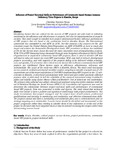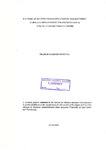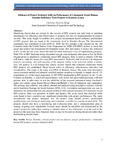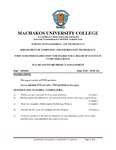| dc.description.abstract | Identifying factors that are critical for the success of HIV projects not only leads to initiating mechanisms for efficiency and effectiveness in projects, but also for implementation of projects on time. This study sought to establish how project environment factors influence performance of HIV projects that are based at the community level in Kiambu, Kenya. The International community has committed to end AIDS by 2030, but this remains a big concern for the 160 Countries under the United Nations Joint Programme on AIDS (UNAIDS) on how to reach this target and achieve the Sustainable Development Goals. HIV prevalence in Kenya has stabilized at 6% for the last ten years, hence the need for more innovative ways of implementing projects. With 53% of HIV financing being channeled through extra budgetary allocation to Not for Profit Organizations to implement community based HIV projects, there is need to identify CSF that will lead to value for money for every HIV intervention. With only half of Africa’s development projects succeeding, and with majority of the projects failing to be delivered within schedule, cost, and quality, it is of essence that critical success factors that influence community based HIV projects are established. These factors relate to efficiency, effectiveness, relevance and sustainability. The scope of the study was NPOs in Kiambu, Kenya. The study used descriptive survey research method and adopted stratified random sampling to identify a sample size of 151 respondents out of the target population of 249 NPOs implementing HIV projects in the 12 sub-Counties in Kiambu. A structured questionnaire with closed and open ended questions collected primary data. A pilot study to test the reliability of the research instrument using Cronbach’s alpha and validity using Kaiser-Meyer-Olkin and Bartlett’s Test of Sphericity was undertaken. The primary data collected was edited, cleaned and analyzed using descriptive statistics with the aid of Statistical Package for Social Science (SPSS 21.0). Correlation and regression was used to determine the relationship between project technical skills and performance of Community based HIV projects. Data was presented in tables and figures. The study found that technical skills were found to have a positive and significant relationship with project performance. The study recommends that project managers and the project team should possess professional qualifications and training in monitoring and evaluation, and effective communication skills. The projects should also have a monitoring and evaluation plan, and a communication plan or strategy targeting each stakeholder. Lessons learnt should be identified and documented as the project progresses rather than waiting to identify them at key milestones or at the end of the project as the team may have forgotten them or may be focused in closing the project rather than documenting lessons learnt. | en_US |




